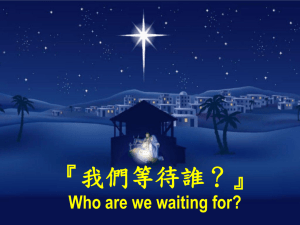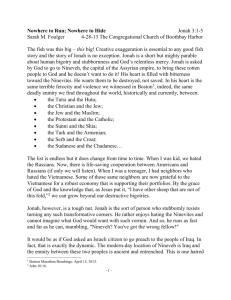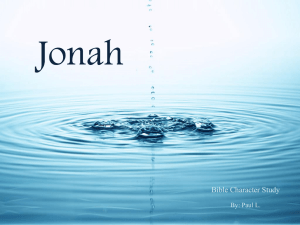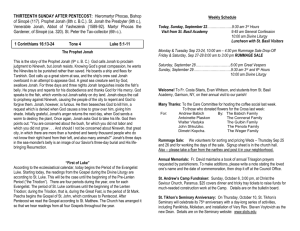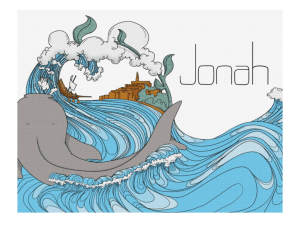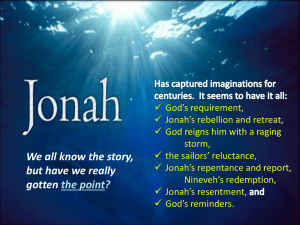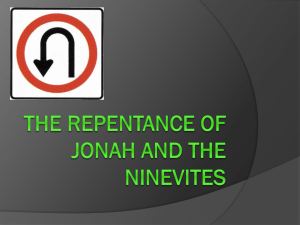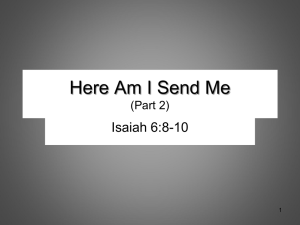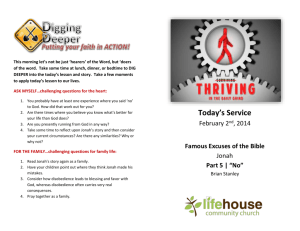3:1-4:11 Pagan Sinners Saved
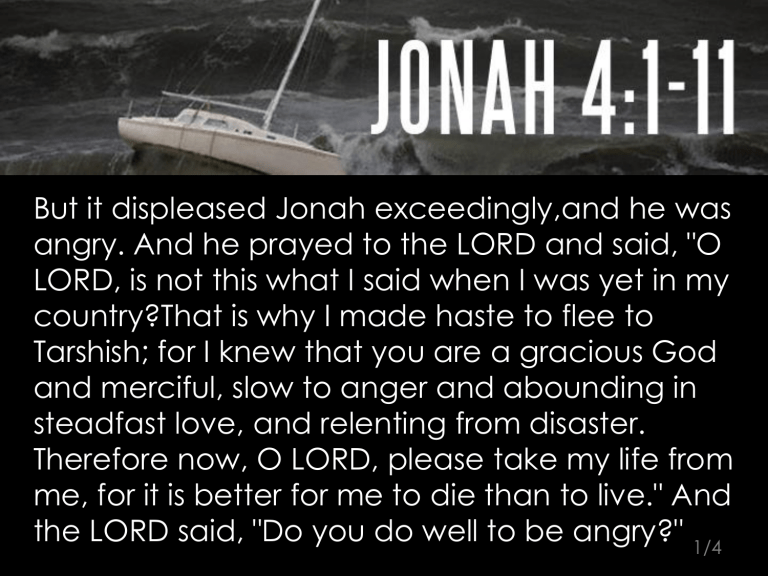
But it displeased Jonah exceedingly,and he was angry. And he prayed to the LORD and said, "O
LORD, is not this what I said when I was yet in my country?That is why I made haste to flee to
Tarshish; for I knew that you are a gracious God and merciful, slow to anger and abounding in steadfast love, and relenting from disaster.
Therefore now, O LORD, please take my life from me, for it is better for me to die than to live." And the LORD said, "Do you do well to be angry?"
1/4
Jonah went out of the city and sat to the east of the city and made a booth for himself there. He sat under it in the shade, till he should see what would become of the city. Now the LORD God appointed a plant and made it come up over
Jonah, that it might be a shade over his head, to save him from his discomfort. So Jonah was exceedingly glad because of the plant. But when dawn came up the next day, God appointed a worm that attacked the plant, so that it withered.
When the sun rose, God appointed a scorching east wind, and the sun beat down on the head of
Jonah so that he was faint. And he asked that he might die and said, "It is better for me to die than to live." But God said to Jonah, "Do you do well to be angry for the plant?" And he said, "Yes, I do well to be angry, angry enough to die."
3/4
And the LORD said, "You pity the plant, for which you did not labor, nor did you make it grow, which came into being in a night and perished in a night. And should not I pity Nineveh, that great city, in which there are more than 120,000 persons who do not know their right hand from their left, and also much cattle?"
4/4
Book of Jonah
• 3 Group Questions:
– 1. What is the author saying to the audience?
– 2. What is the response the author wants from the audience?
– 3. What should be our response?
What’s the purpose of studying the Bible?
To know what the biblical text is teaching not what we learn from the text.
We need to learn what the Bible is teaching.
I. 1:1-2:10
Hebrew Sinner Saved
A. 1:1-3
Jonah’s disobedience
B. 1:4-16
Sailor’s repentance
C. 1:17-2:10
Jonah’s rescue by
Yahweh
1. 1:17 God’s grace
2. 2:1-9 Jonah’s praise
3. 2:10 God’s last word
II. 3:1-4:11
Pagan Sinners Saved
A. 3:1-4
Jonah’s obedience
B. 3:5-9
Nineveh’s repentance
C. 3:10 – 4:11
Jonah’s rebuke of
Yahweh
1. 3:10 God’s grace
2. 4:1-3 Jonah’s complaint
3. 4:4-11 God’s last word
7 Purposes of God in Jonah
To show God’s:
1. Character compassion, patience, mercy, love
2. Sovereignty nature: wind, sea, fish, plant, worm
[decreasing size] humanity: individuals (Jonah), communities
(sailors), cities (Nineveh), nations (Assyria)
[increasing size] life & death
7 Purposes of God in Jonah
(continued)
3. Ways
4. Otherness
Cf. Humanity
5. Salvation
6. Heart for the Nations
7. Mission Strategy
Then the Lord sent a great wind on the sea
(II. 5-6; 1:4).
But the Lord provided a great fish to swallow Jonah (II. 28-29; 1:17).
Then the Lord God provided a vine (II. 66-
67; 4-6).
In all three occasions the same Hebrew verb was used.
What did this imply to the first audience?
did not bring upon them the destruction he had threatened (I. 58; 3:10).
to give shade for his head to ease his discomfort (I. 67-68; 4:6).
The same Hebrew noun was used in both situations.
What does this imply to the original audience?
The Names of God in the Book of
Yahweh (He [who] is)
Jonah
el
1:1, 3, 3, 4, 9, 10, 14, 14, 14, 16, 16, 17
2:1, 2, 6, 7, 9, 10
3:1, 3
4:2, 2, 3, 4, 6, 10
(mighty one)
4:2 (l. 61)
elohim (God, gods, objects of worship)
1:5, 6, 9
2:1, 6
3: 5, 8, 9, 10, 10
4:6, 7, 8, 9
What did the use of the different Hebrew names of God throughout the text imply to the first audience?
What was the issue that prevented Jonah from going to
Nineveh?
1. Ethnic
2. Ethical
3. Theological a. God is gracious and compassionate
(II. 61-62; 4:2b) b. Ninevites will paganly repent c. God will extend his grace and compassion d. Unacceptable result
4 Common Elements for
Oracles of Judgment
1. Indictment
2. Judgment
3. Instruction
4. Hope
Jonah offered only judgment.
What did this show about the prophet?
Comparison of Ninevites with Jonah’s
Object Lesson
Action
• Calamity
• Human
Protection
Ninevites
• Judgment (3:10)
• Repentance
• God’s Grace
• God Removes
His Grace
• No Judgment
Jonah
• Sun (4:6)
• Hut
• Plant
• Worm
